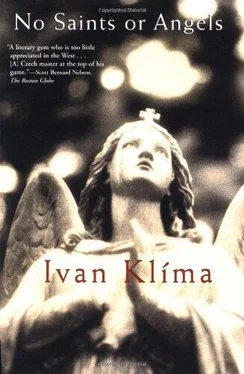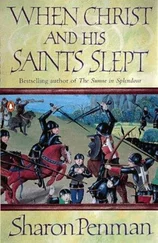'Can't you tell?'
'I think he still loves me, or at least he fancies he does, but he doesn't always act as if he did,' I say. 'But, Mum, you should be getting some rest and not worrying about me.'
'I have to worry now. I don't know how long I'll be around, do I?'
'You'll be around for a long time yet.' I go over and plump up her duvet. 'Lie down now and don't think about anything. Rest, you've lost lots of blood.'
'No, wait a minute. But you don't want to get married, do you?'
'Mum, marriage is the last thing on my mind. It's enough that one bloke left me.'
'You can't get that man out of your mind. But someone else wouldn't leave you, or if he did, he'd come back again, like your father.'
'What do you mean, like Dad?'
'Before he died he asked me to forgive him all his mistresses.'
'He told you he'd had mistresses?'
'I knew anyway. I even knew about that son of his. People came and told me about it.'
I remain silent. I don't know what to say. Then I ask her, 'Why didn't you tell us about it?'
'It was his business to tell you. Maybe it s just as well you didn't know, seeing that he stayed with us and didn't leave the home.'
'Maybe you should have left home.'
'I thought about it, but I was afraid to. Dad was a powerful man; I thought he would protect me.'
'Who from?'
'In case the Germans came back again.'
'Mum! The Germans weren't a threat any more. It was the Russians who came.'
'I wasn't scared of them.'
'And that's why you didn't leave?'
'And because of the two of you. Besides, I loved him. He could be nice.'
It strikes me that my mother has never known a nice man. Have I? Maybe nice men are figments of our imagination.
'Besides, I didn't want a divorce after what happened to my mother.'
'But they were different times.'
'I know. But people ought to stay together. Anyway it was your grannie who suggested the divorce. Or at least that's how my father told it. She knew what his business meant to him. She only pretended to move out; she stayed with us.' Mum starts to reminisce: 'I remember at home how they used to make beautiful flowers out of leather, cloth and wire. I used to sit there with Mum and she would talk to me and tell me Bible stories, for instance. She guessed we wouldn't be together much longer. After all, she'd studied law, so she must have known about those Nuremberg Laws.'
I'm aware that Mum has never talked about her mother's life, only about Grandma's awful death.
'And she also talked to me about the Jewish festivals, such as the Day of Atonement. People are supposed to forgive even those who have done them wrong. You see, I can remember it after all these years. But I wasn't able to forgive my father as long as he was
alive. Then I had a bad conscience about it. You have to take people the way they are, with all their faults and their selfishness. If you don't you get left outside.'
'Outside what?' I ask, although I know what she means.
Maybe she doesn't even hear me; she's tired. We both are. She closes her eyes and says nothing for a while. I am still holding her hand. 'So I forgave your dad,' she adds, 'and you should too. You'll feel much better, you'll see.'
3
On the way home from Mum's I find myself in front of Capek's villa, although I wasn't conscious of taking that route. It is quiet and locked up as usual, but there are a few cars parked on the little square; drops of rain are starting to drum on their bonnets.
It crosses my mind that in a few weeks' time it will already be the sixtieth anniversary of my favourite author's death. He was a brave man and he suffered from ill health. When he was my age, he had less than four years left to live. When he was my age he wrote: People have a piece of crystal inside them, something smooth, pure and hard, that won't mix with anything and will allow everything to slide over it.
I'd love to have a piece of hard crystal inside me and let all my pain, my disappointments, my despair and my loneliness slide over it.
When I get home there is no one waiting for me. And no one will ever be waiting to take me in his arms and caress me. And if Jana comes home, how long will she stay? And what about my first and only husband? For all those years I subconsciously waited for him to ring the doorbell and say, Sorry, Kristýna, I've done you wrong, but I've found out that it is hard to live without you! But my first and only husband will never ring the doorbell now. And what about Jan, who says he loves me, but was unfaithful to me the first opportunity he had? Should I make it up with him
and simply accept that life is like that: betrayal, desertion and forgiveness, and those that don't accept it, suffer?
I pour myself some wine and put on Tchaikovsky's Pathétique. Let the music weep instead of me. Even though I'm on my own, I'm not the only one who found life hard to live.
I oughtn't to drink. It's ages since wine gave me a boost or improved my mood. It adds to my weariness, more likely. Instead of wine I ought to take Nortriptylin or some other antidepressant. It's just that I don't like the idea of Prozac euphoria.
I sit in the armchair and sleep overcomes me: now I'm lying in a meadow in tall, dry grass; above me there are clouds and beneath them a wisp of smoke, too late I catch sight of a flaming figure tearing towards me. And behind it there are flames. I won't escape them. The end at last. I feel no fear. I am paralysed, so totally alone, the way you feel at the moment when flames start to engulf you and you haven't the strength to run away.
The doorbell.
The ghost of that crazy incinerated aunt has come back to take me with her.
I'm afraid to answer the door and ask, 'Who's there?'
But it's Jan; he is standing outside with water streaming from his soaking hair. He is carrying a suitcase.
'What are you doing here?'
'Don't send me away,' he begs. 'I have to tell you something.'
'Is it still raining out?' I ask stupidly.
'I expect so,' he says. 'I didn't notice.'
'So what do you want to tell me?'
'I've moved out of Mum's place.'
He has moved out. His mother noticed that he was down in the dumps and in the end she managed to get out of him that he is in love with me and that all is not well between us. He also told her about Jana, and his mother made a scene and started to shout at him that he had no sense, so he packed a few things and walked out. He just wanted to let me know.
I don't know what to reply. He's had a row and tomorrow he'll regret it, but I don't want to send him out into the rain at midnight. I go and make some tea and tell him to take off his wet clothes. I even offer him my sweater, but he has his own clothes in the suitcase. I'm sorry for him. I'm touched. Maybe he really does love me and he won't repeat what he did. And I almost certainly love him still.
I make him up a bed in Jana's room. He looks disappointed but accepts it meekly.
I'm unable to get to sleep. I ought to think about the fact that I have my ex-lover in the flat. And whether 'ex' is still appropriate. All I need to do is give him a hug. Get up and join him in his bed — like his other 'ex' did. I ought to think about why he came and whether it isn't just another of his well-choreographed games — a way of finding his way in here. I ought to think about what I'll do when we get up in the morning. Instead I am simply aware of my weariness and helplessness, and my fear of betrayal.
I fall asleep towards morning. I dream that I'm at Grannie Marie's farm at Lipová. She has given me a cup of milk and some bread and butter to take to Auntie Venda. I took them to her, but when I wanted to leave I discovered that in place of a door, there was just a narrow opening in the wall. I realized I wouldn't be able to squeeze through it. I'd be stuck for ever in this room with my mad aunt, and she'll set light to herself and me. And I tried desperately to squeeze through the crack.
Читать дальше












